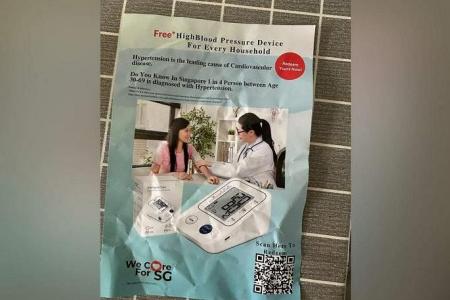Flyer with QR code to redeem free blood pressure device not a scam: AIA
A flyer encouraging households here to scan a QR code to redeem a free blood pressure device is legitimate and not a scam, said insurance firm AIA Singapore on Wednesday.
According to the website linked to the QR code, an AIA financial services consultant will provide a financial sharing session to those who sign up to redeem the device.
A photo of the flyer made its rounds on social media and the HardwareZone forum on Tuesday, with many netizens believing it was a scam.
Users of the forum urged others not to scan the QR code, fearing it could contain malware.
The Straits Times noticed the flyer contained grammatical and punctuation errors, which are often telltale signs of scam messages.
AIA Singapore told ST it had engaged a vendor, We Care For SG, to conduct marketing activities with its authorised insurance representatives.
The AIA spokesman said: “Our customers can be assured that this is not a scam and that integrity is at the core of AIA’s business. All representatives of AIA Singapore are also held to the highest professional standards.”
He added: “We take a zero-tolerance policy to any form of dishonest acts that compromise the integrity of the industry, our business or the trust of our customers, and such acts will be dealt with promptly and without compromise.”
When ST scanned the QR code on the flyer, we were led to a form that required the individual’s name, e-mail address, phone number and home address, among other details.
One of the terms and conditions stated was that during the redemption of the blood pressure device, there would be a 20-minute financial sharing session by an AIA financial services consultant.
The site also said that only the first 2,000 households who sign up would be able to redeem the device.
But some netizens were sceptical and warned others they could lose their life savings if the QR code contained malware.
Some cited a recent ST article about a woman who lost $20,000 after she had scanned a manipulated QR code at a bubble tea shop.
The sticker with the QR code on it had encouraged customers to complete an online survey to get a free cup of milk tea. The QR code had been tampered with by scammers.
A 60-year-old woman scanned the QR code and downloaded a third-party app containing malware, which led to her losing a large chunk of her savings.
This AIA incident is not the first time a legitimate message from an agency was flagged as a scam by members of the public.
In March 2022, the Central Provident Fund (CPF) Board had to clarify that letters asking its members to update their bank accounts were legitimate.
The clarification came after a scam alert, which was forwarded multiple times on WhatsApp and Facebook, had claimed the letter was fake and urged netizens to warn their friends and relatives about it.
In February, some Internet users received SMSes marked as “likely scam” after a system by the Infocomm Media Development Authority (IMDA), known as the SMS Sender ID Registry, kicked in to alert users to possible scam messages.
But some of these SMSes marked as “likely scam” came from legitimate businesses over genuine messages.
IMDA had said then that it could have been due to unregistered IDs or late applications by companies that were in the process of being verified.
Get The New Paper on your phone with the free TNP app. Download from the Apple App Store or Google Play Store now

